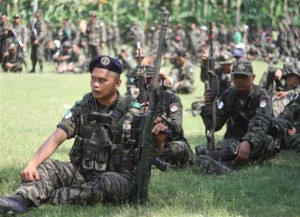Philippine peace plan offers economic hope

Members of the Moro Islamic Liberation Front gather at their stronghold at Camp Darapanan in Maguindanao province in southern Philippines last October 15, 2012. AP FILE PHOTO/KARLOS MANLUPIG
DATU ABDULLAH SANGKI, Philippines – Joey Peneza plants palm trees on his farm in the southern Philippines with fresh optimism, buoyed by a peace pact he hopes will finally see the violence-plagued region prosper.
Peneza spent the past two decades working abroad as a sailor, safe from the Muslim separatist rebellion that has claimed tens of thousands of lives and left large tracts of the country’s south mired in deep poverty and corruption.
But he returned to the Mindanao region recently to establish a small palm oil farm, hoping that an imminent peace deal between the government and the rebels would finally allow him to make a living at home.
“I am taking a big risk here,” Peneza, 38 and a father-of-two, told AFP on a recent visit to his farm.
“But I’m hoping to get a return on my investment soon.”
Article continues after this advertisementThe peace deal that helped to lure Peneza home was signed on October 15 in Manila at a nationally televised ceremony overseen by President Benigno Aquino and Murad Ebrahim, the chief of 12,000-strong Moro Islamic Liberation Front.
Article continues after this advertisementThe MILF has been fighting since the 1970s for independence in Mindanao, the southern third of the mainly Catholic Philippines that the country’s Muslim minority claim as their ancestral homeland.
The peace pact spells out broad details on how to end the rebellion by 2016, chiefly the creation of an autonomous Muslim homeland on parts of Mindanao.
It also outlines plans to disarm the guerrillas and make them partners in unlocking Mindanao’s vast economic potential.
The government has been quick to claim the new deal will draw foreign investors into Mindanao even before a final peace is achieved.
Trade Secretary Gregory Domingo boasted last week of “hundreds of millions of dollars” in planned investments for Mindanao over the next 12 to 18 months.
He said diplomats from Japan, Malaysia, India and France had also approached the government inquiring about investing in the mining, power, manufacturing and agribusiness sectors.
Mindanao is believed to have a large chunk of the nation’s estimated $840 billion in gold, copper and other mineral reserves.
It also has vast, fertile plains ripe for farming that have been left uncultivated because of the conflict and general lawlessness of the area.
Domingo said tourism could also play a major role, with Mindanao having a range of natural wonders, including stretches of pristine white-sand beaches.
But security and business analysts said that expectations of a quick turnaround in fortunes for Mindanao were optimistic at best, and potentially completely unrealistic.
For a start, there is no guarantee that the pact, which consists of only broad commitments from both sides and very few details, will actually lead to a final peace, they said.
The conflict has also led to a proliferation of high-powered guns in the hands of Al-Qaeda-linked militants and other Muslim groups opposed to the deal, any of which could seek to sabotage peace hopes with attacks of their own.
Those groups are well known to be behind kidnappings of foreigners and Filipinos, as well as bombings and extortion targeting business people.
“There are no absolute guarantees that this agreement will bring any immediate or even midterm stability to Mindanao,” Richard Jacobson, director of operations at Manila-based political risk consultancy Pacific Strategies and Assessment, told AFP.
“Indeed, over the immediate term there could actually be some increased instability in parts of the region.”
Jacobson said small foreign investments might be made in the danger zones soon as a quick response to the deal, primarily from Malaysia and other Muslim countries looking to exploit agriculture.
“However, at this point in time we expect to see most foreign investors adopt a wait-and-see attitude,” Jacobson said.
John Forbes, a top official of the American Chamber of Commerce of the Philippines, also cautioned that foreign business people would not invest until their safety was assured.
“Rule of law and peace and order have to be demonstrated for a period of time before you can get really robust foreign investments,” Forbes said.
“Ultimately there is potential for these investments but it will take a long time.”